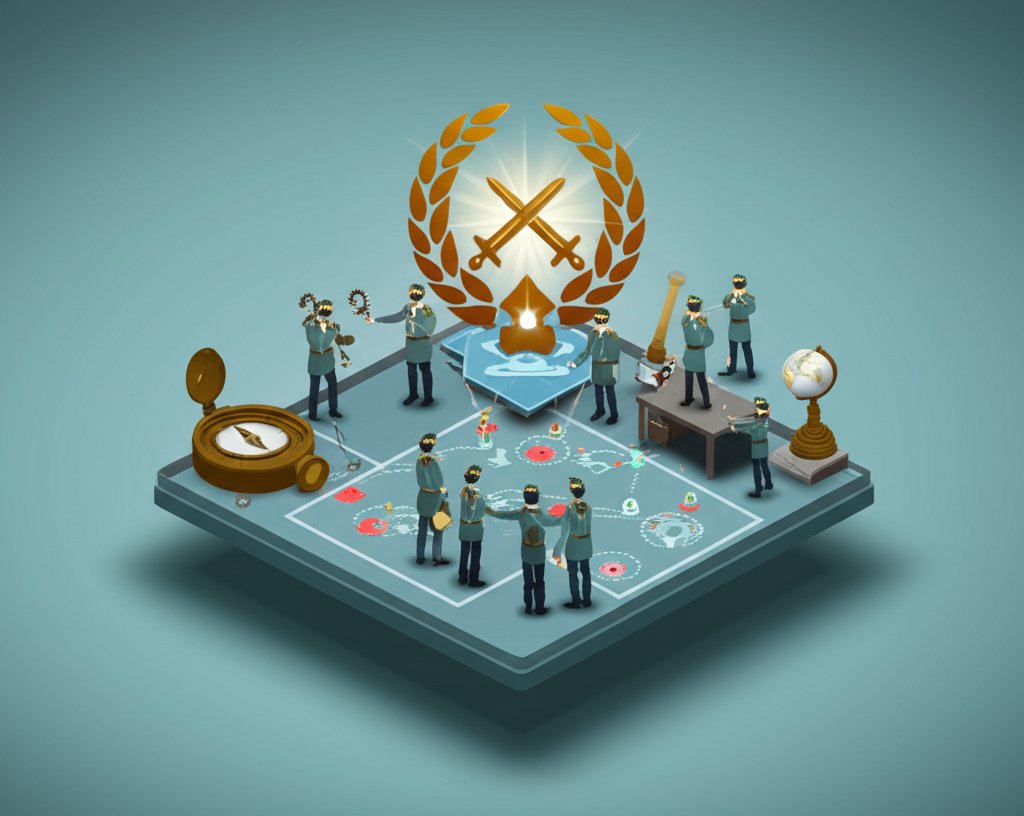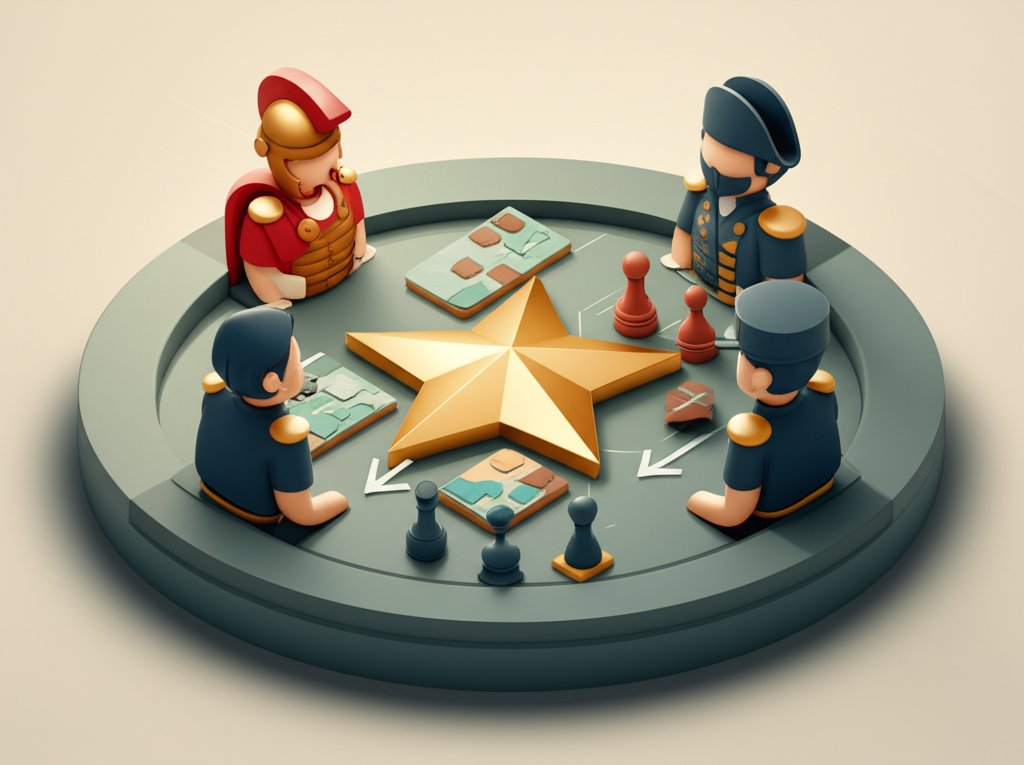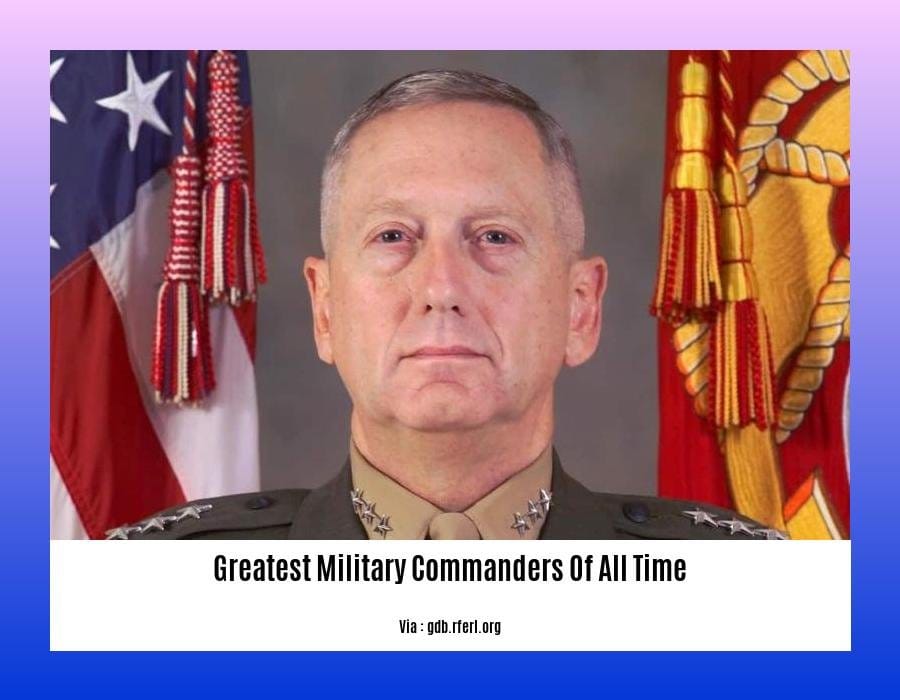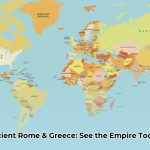From the thunderous clash of ancient phalanxes to the strategic maneuvers of modern artillery, military history is punctuated by epic figures whose decisions reshaped the world. But who truly stands among the greatest military commanders, and what defines these military commanders of all time as legends rather than mere leaders? This comprehensive article delves into the lives, strategies, and enduring legacies of these exceptional individuals, focusing on iconic figures like Alexander the Great and Napoleon Bonaparte, and exploring the multifaceted criteria that elevate them to the pinnacle of military genius. Prepare to embark on a captivating journey through the annals of warfare, understanding not just what they achieved, but how and why their impact continues to resonate through the ages.
Defining Military Genius: What Makes a Commander Great?

Before we unveil the titans of warfare, it’s essential to understand the core attributes that distinguish the greatest military commanders of all time. Their brilliance wasn’t solely about winning battles, but about a complex interplay of intellect, character, and circumstance.
Identifying what traits define military genius allows us to better appreciate the strategic brilliance and leadership qualities displayed by figures like Alexander the Great, some of history’s most iconic military leaders.
Strategic Brilliance and Tactical Acumen
A truly great commander possesses an unparalleled ability to envision the entire campaign (strategy) and execute specific engagements (tactics). This includes:
Unwavering Leadership and Charisma
Beyond intellect, a commander’s ability to inspire and motivate their troops is paramount. This encompasses:
Logistics, Supply Chains, and the Art of Organization
Often overlooked but critically important, the ability to manage the mundane details of war is a hallmark of the greatest military commanders. This includes:
Titans of Antiquity: Shaping Early Military History
The foundations of military history are built upon the exploits of commanders who forged empires and defined martial prowess in an era of steel and shield. These are some of the greatest military commanders from ancient times.
Alexander the Great: The Unconquered Conqueror
Alexander the Great (356–323 BCE), King of Macedon, stands as an undisputed titan among military commanders of all time. Inheriting a powerful army and a vision from his father, Philip II, Alexander unleashed a whirlwind of conquest that stretched from Greece to India in just over a decade.
- Key Campaigns and Strategies: His campaigns against the mighty Persian Empire are legendary. At the Battle of Granicus (334 BCE), he demonstrated daring and tactical flexibility. At Issus (333 BCE) and Gaugamela (331 BCE), he faced vastly superior numbers but used brilliant maneuvers, notably the “hammer and anvil” tactic (fixing the enemy with his phalanx, then crushing them with cavalry), to achieve decisive victories. His siegecraft, as seen at Tyre, was equally formidable.
- Leadership and Vision: Alexander’s personal courage, often fighting at the front, inspired immense loyalty. His strategic vision extended beyond mere conquest; he aimed to Hellenize the East and foster a new Greco-Persian culture, though his premature death cut this short.
- Legacy: Alexander the Great’s campaigns profoundly impacted
military history, spreading Greek culture and influencing subsequent military thinkers. His name became synonymous with unparalleled military success.
Hannibal Barca: The Carthaginian Mastermind
Hannibal Barca (247–183/181 BCE), the Carthaginian general, is revered for his audacious invasion of Italy during the Second Punic War and his tactical genius.
- Audacious Campaigns: Hannibal’s most famous feat was leading his army, complete with war elephants, across the Alps into Italy – a logistical nightmare that stunned Rome.
- Battle of Cannae (216 BCE): This battle remains a masterpiece of tactical envelopment. Facing a numerically superior Roman army, Hannibal deliberately allowed his center to recede, drawing the Romans into a trap, then encircled and annihilated them. It’s considered one of the most perfect tactical victories in
military history. - Strategic Impact: Though he ultimately lost the war, Hannibal’s strategies and his ability to maintain an army deep within enemy territory for over a decade against overwhelming odds cemented his place among the
greatest military commanders of all time.
Julius Caesar: Rome’s Indomitable General
Julius Caesar (100–44 BCE) was a Roman general and statesman whose campaigns fundamentally shaped Rome’s destiny and left an indelible mark on military history.
- Gallic Wars: Caesar’s conquest of Gaul (58–50 BCE) showcased his tactical brilliance, engineering prowess (e.g., the bridge over the Rhine), and ability to wage war on multiple fronts. The siege of Alesia (52 BCE) is a prime example, where he built circumvallations and contravallations to besiege Vercingetorix while simultaneously fending off a massive relief army.
- Civil War and Leadership: His leadership during the Roman Civil War, exemplified by his crossing of the Rubicon, demonstrated his political and military audacity. His campaigns in Greece and Egypt further showcased his strategic acumen.
- Impact: Caesar’s victories extended Roman power, and his writings (
Commentarii de Bello Gallico) remain invaluable primary sources formilitary historyand strategic study. He created loyal legions that followed him over the Republic, profoundly altering the trajectory of Rome.
Architects of Empire: Medieval and Early Modern Masterminds
From the vast steppes of Mongolia to the battlefields of Europe, these commanders revolutionized warfare during the medieval and early modern periods, using unique tactics to forge unparalleled empires.
Genghis Khan: The Mongol Whirlwind
Genghis Khan (c. 1162–1227) united the nomadic tribes of Mongolia and launched an empire-building campaign that would become the largest contiguous land empire in military history. He is arguably one of the most impactful military commanders of all time.
- Innovative Cavalry Tactics: The Mongols’ success lay in their highly disciplined, incredibly mobile cavalry. They perfected sophisticated tactics like the “feigned retreat,” encircling movements, and relentless pursuit, overwhelming even larger, more settled armies.
- Psychological Warfare and Logistics: Genghis Khan understood the power of fear and reputation. He also mastered logistics, enabling his armies to travel vast distances, living off the land or utilizing efficient supply systems.
- Unified Command: His ability to unite disparate tribes under a single, highly effective command structure was a crucial factor in his success and a lesson in military organization. His empire stretched from Eastern Europe to the Pacific, a testament to his unparalleled military and organizational genius.
Saladin: The Sultan of Unity
Saladin (1137/1138–1193) was the first Sultan of Egypt and Syria and the founder of the Ayyubid dynasty. He is celebrated for uniting Muslim forces against the Crusaders and recapturing Jerusalem.
- Unification and Diplomacy: Saladin’s genius was not just on the battlefield but also in diplomacy, skillfully uniting fragmented Muslim states under his banner.
- Battle of Hattin (1187): His decisive victory against the Crusader armies at Hattin was a strategic masterpiece, cutting off their water supply and then annihilating them, leading directly to the recapture of Jerusalem.
- Chivalry and Respect: Saladin earned the respect of his enemies, including Richard the Lionheart, for his chivalry and humane treatment of prisoners, a rare quality among
greatest military commandersof any era.
Gustavus Adolphus: The Father of Modern Warfare
Gustavus Adolphus (1594–1632), King of Sweden, transformed warfare during the Thirty Years’ War, earning him the title “Father of Modern Warfare” and a place among the greatest military commanders.
- Tactical Innovations: He introduced crucial innovations like lighter, more mobile artillery that could be moved on the battlefield, the “salvo” volley fire from musketeers, and more flexible linear formations instead of cumbersome squares.
- Combined Arms Approach: Gustavus effectively integrated infantry, cavalry, and artillery into a cohesive fighting force, each supporting the others.
- Discipline and Training: His Swedish army was renowned for its high level of training, discipline, and religious fervor, which gave them a significant edge. His death at the Battle of Lützen was a major blow to the Protestant cause but cemented his legacy in
military history.
The Napoleonic Era and Beyond: Revolutionizing Modern Warfare
The 18th and 19th centuries witnessed dramatic shifts in technology, political structures, and the scale of conflict, giving rise to new types of greatest military commanders who harnessed these changes.
Napoleon Bonaparte: The Grand Strategist
Napoleon Bonaparte (1769–1821), Emperor of the French, revolutionized European warfare with his lightning campaigns and innovative strategies, cementing his status as one of the most studied military commanders of all time.
- Revolutionary Tactics and Strategic Maneuver: Emerging from the French Revolution, Napoleon capitalized on the new concept of mass conscription. He reorganized the army into self-sufficient ‘corps,’ enabling rapid movement and allowing him to concentrate forces at critical points – often referred to as his manoeuvre sur les derrières (maneuver on the enemy’s rear).
- Battle of Austerlitz (1805): Known as the “Battle of the Three Emperors,” Austerlitz is widely considered Napoleon’s greatest strategic victory. By feigning weakness on his right flank, he drew the Allied forces (Austrian and Russian) into a trap, then launched a devastating attack through their weakened center, splitting and destroying their army.
- Artillery and Intelligence: Napoleon was an artillery officer, and he masterfully integrated massed artillery fire to soften enemy lines before his infantry attacks. He also excelled at intelligence gathering and deception.
- Enduring Legacy: Napoleon Bonaparte’s campaigns and writings deeply influenced military thought for generations. Concepts like the corps system, the importance of speed, surprise, and concentration of force remain fundamental to military doctrine worldwide. His impact on
military historyis arguably unmatched in the modern era.
Frederick the Great: The Philosopher King of Prussia
Frederick II of Prussia (1712–1786), known as Frederick the Great, was a brilliant military strategist and tactician who transformed Prussia into a major European power through his disciplined army and innovative maneuvers.
- Oblique Order: Frederick perfected the “oblique order” tactic, where he would concentrate his forces on one flank of the enemy, weakening his own other flank but aiming for a decisive blow. This was famously executed at the Battle of Leuthen (1757).
- Discipline and Training: His Prussian army was the most disciplined and well-trained of its era, capable of executing complex maneuvers with precision. Frederick’s relentless pursuit of efficiency and his personal command style made him a feared opponent.
- Strategic Resilience: Despite facing coalitions of superior powers (Austria, France, Russia) during the Seven Years’ War, Frederick’s strategic tenacity and tactical brilliance allowed Prussia to survive and thrive. His insights are still studied by aspiring
greatest military commanders.
Ulysses S. Grant: The Unyielding General
Ulysses S. Grant (1822–1885) was the leading Union general in the American Civil War, whose strategic vision and relentless pursuit of victory ultimately crushed the Confederacy.
- Strategic Persistence and Total War: Unlike previous Union generals, Grant understood the concept of “total war” – crippling the South’s ability to wage war by targeting their economic and logistical infrastructure, not just their armies. His Vicksburg campaign (1863) brilliantly secured the Mississippi River.
- Overland Campaign (1864): In this brutal campaign against Robert E. Lee, Grant sustained heavy casualties but never retreated, continuously maneuvering around Lee’s flank and forcing him into a war of attrition that the Confederacy could not win.
- Logistics and Coordination: Grant excelled at coordinating multiple armies across vast theaters, leveraging the Union’s superior industrial capacity and manpower. His pragmatism and determination place him among the
greatest military commanders of all time.
The Enduring Impact and Ethical Reflections on Military History
The study of greatest military commanders offers invaluable insights into leadership, strategy, and human ambition. However, it also compels us to confront the profound ethical dimensions of warfare and its lasting consequences.
Shaping Nations and Civilizations
The campaigns of military commanders of all time have not merely won battles; they have redrawn maps, collapsed empires, birthed new nations, and fundamentally altered cultural and political trajectories. From Alexander the Great spreading Hellenism to Genghis Khan facilitating trade and cultural exchange across Eurasia, their actions rippled through centuries. The legal and administrative reforms under Napoleon Bonaparte, for example, are still visible in European law today. Understanding these figures is crucial to understanding the broad sweep of military history and world development.
The Human Cost of Conquest: A Sobering Reality
While we celebrate the strategic genius and tactical prowess of these commanders, it is critical to acknowledge the immense human suffering that underpins their victories. Every brilliant maneuver, every decisive battle, came at an incalculable cost in human lives, shattered families, and devastated communities. The glory associated with conquest often overshadows the agony of the conquered and the sacrifices of the soldiers, regardless of their allegiance. A comprehensive look at military history demands an empathetic lens, recognizing that the strategies of the greatest military commanders were often written in blood and tears, leaving behind legacies that are complex and, at times, morally challenging.
Lessons for Modern Leadership
Despite the ethical complexities, the study of these greatest military commanders offers timeless lessons in leadership, decision-making under pressure, strategic thinking, and the art of resource management. Modern leaders, whether in business, politics, or military, can draw inspiration from their adaptability, vision, and ability to motivate. However, the ultimate lesson may be the profound responsibility that comes with power and the critical importance of seeking peaceful resolutions whenever possible, understanding the true cost of conflict.
Conclusion

The military history of the world is a rich tapestry woven with the threads of courage, genius, and devastating conflict. The greatest military commanders — from Alexander the Great and Hannibal Barca to Genghis Khan and Napoleon Bonaparte — were figures of immense will and intellect, who, through their strategic brilliance and unwavering leadership, fundamentally altered the course of human events.
By dissecting their campaigns, understanding their innovations, and acknowledging their profound impact, we gain a deeper appreciation for the evolution of warfare and the complex forces that shape societies. Their legacies, though often intertwined with immense human cost, continue to serve as powerful case studies in strategy, leadership, and the enduring human capacity for both destruction and creation. The journey through the lives of these military commanders of all time is not merely an exploration of past battles, but a vital reflection on the very nature of power, ambition, and the indelible marks left upon our shared history.
FAQ
Q1: Who are considered the absolute greatest military commanders of all time?
A1: While subjective, a consensus list of the greatest military commanders of all time typically includes figures such as Alexander the Great, Hannibal Barca, Julius Caesar, Genghis Khan, Saladin, Gustavus Adolphus, Frederick the Great, and Napoleon Bonaparte. Others like Sun Tzu (as a strategist), Khalid ibn al-Walid, and Ulysses S. Grant are also frequently mentioned for their profound impact on military history.
Q2: What factors truly contribute to the greatness of a military commander?
A2: Greatness in military commanders stems from a combination of strategic brilliance, tactical acumen, unwavering leadership, charisma, adaptability, and exceptional logistical and organizational skills. They possess the ability to inspire troops, innovate new methods of warfare, and make decisive decisions under immense pressure.
Q3: How did Alexander the Great change military history?
A3: Alexander the Great revolutionized military history through his aggressive and innovative use of combined arms tactics (phalanx and cavalry), his daring strategic maneuvers against numerically superior forces, and his unparalleled speed of conquest. He spread Hellenistic culture across a vast empire, fundamentally altering the geopolitical landscape of his era.
Q4: What were Napoleon Bonaparte’s most significant contributions to warfare?
A4: Napoleon Bonaparte profoundly influenced military history by developing the corps system, enabling unprecedented speed and flexibility in army movements. He mastered the art of massed artillery, the “maneuver sur les derrières,” and the effective use of intelligence and deception. His campaigns and writings laid the foundation for modern military doctrine and strategy.
Q5: Are there any non-European military commanders of all time who are considered among the greatest?
A5: Absolutely. Genghis Khan (Mongolia) is renowned for creating the largest contiguous land empire in military history through innovative cavalry tactics. Saladin (Kurdish/Egyptian) is celebrated for uniting Muslim forces and his chivalry during the Crusades. Khalid ibn al-Walid (Arabian Peninsula) was an undefeated general of the early Islamic conquests. Sun Tzu (China), though primarily a strategist, wrote “The Art of War,” a timeless text on military theory.
Q6: What is the ethical perspective on celebrating greatest military commanders?
A6: While recognizing their strategic genius and historical impact, it’s crucial to approach the topic of greatest military commanders with an awareness of the immense human cost of war. Their victories often resulted in widespread death, suffering, and destruction. A balanced perspective acknowledges their military achievements while also reflecting on the profound ethical implications and the devastating consequences of the conflicts they led.










